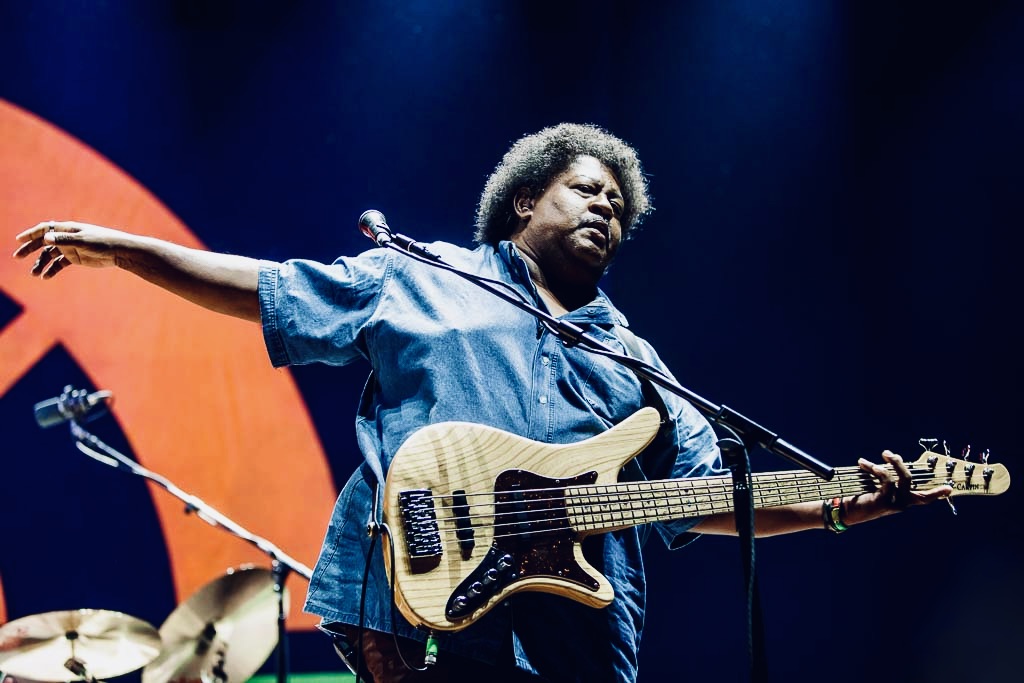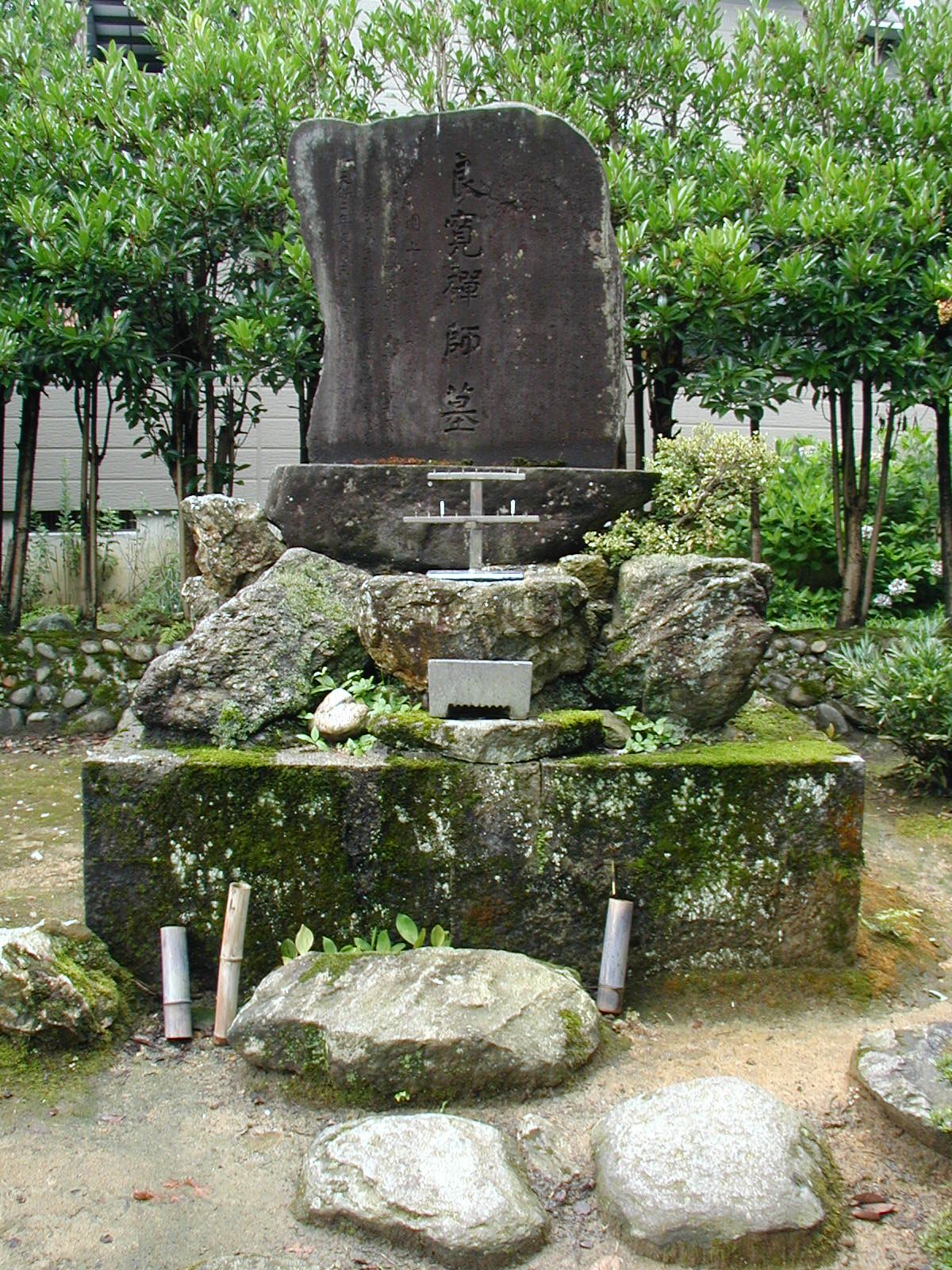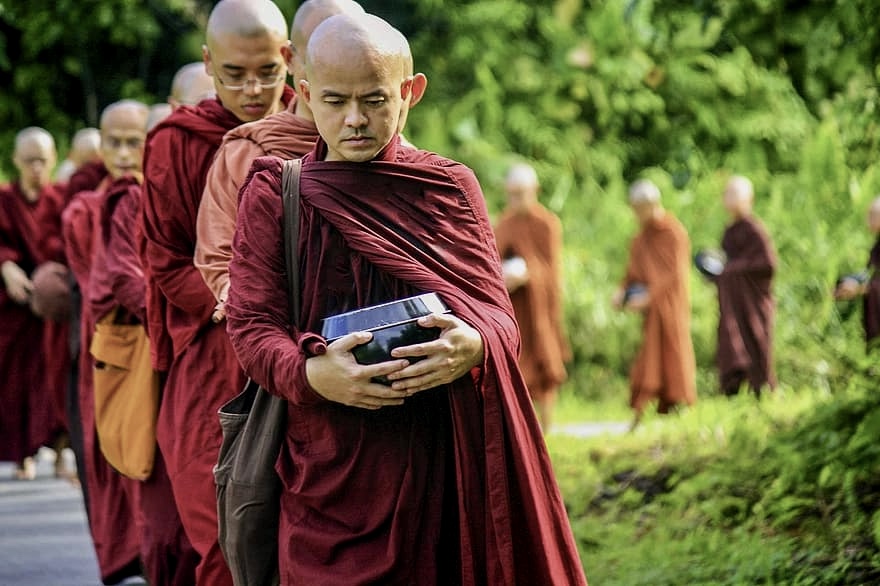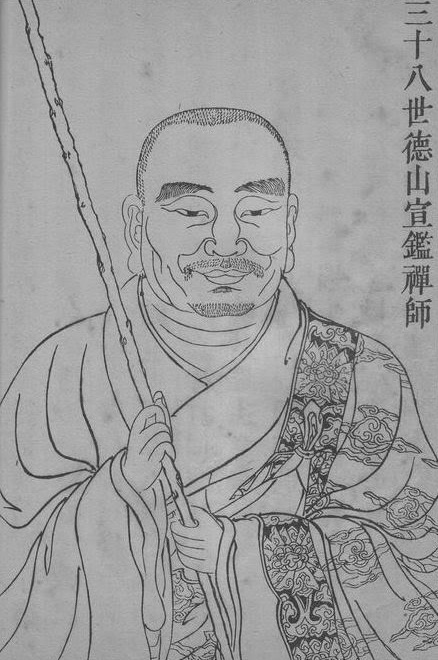
Among the enlightened
adepts, being able to speak the
Truth has nothing to do with the
tongue, and being able to talk
about the Dharma is not a
matter of words.

Among the enlightened
adepts, being able to speak the
Truth has nothing to do with the
tongue, and being able to talk
about the Dharma is not a
matter of words.

As a boy I studied
literature, but was too lazy to
become a Confucian; in my younger days
I worked at Zen, but got no Dharma worth handing
down. Now I’ve built a grass hut, act as
custodian of a Shinto shrine,
half a shrine, half
a monk.

Having left the Fifth Ancestral Teacher’s place, Hui Neng traveled south for two months, and had reached the Ta Yu Range. He was pursued by the monk Hui Ming, who was originally a general, accompanied by several hundred men, who wanted to seize the robe and bowl (emblematic of succession to the ancestral teachers).
Ming was the first to overtake him. The Sixth Ancestral Teacher threw down the robe and bowl on a rock and said, “This robe signifies faith: how can it be taken by force?” Ming tried to pick up the robe and bowl, but was unable to move them. At that point he said, “I have come for the Dharma, not for the robe.”
The Ancestral Teacher said, “Since you’ve come for the Dharma, you should put to rest all your motivations, and don’t give rise to a single thought, and I will explain for you.” After a silence, he said, “Without thinking of good, and without thinking of evil, at just such a time, which is your original face?”
At these words, Hui Ming was greatly enlightened. He also asked, “Besides the intimate words and meaning that struck home a moment ago, is there any further intimate message?”
The ancestral teacher said, “If it were said to you, it wouldn’t be intimate. If you turn around and reflect, what’s intimate is in you.”

If you can refrain from producing a single thought, you’ll be forever freed from birth and death, and will not be bound up by birth and death. You go when you want to go and sit when you want to sit — what further concern is there?
Don’t go crazy; I suggest to you that it would be better to stop and not be obsessed with anything. The moment a thought flashes through your mind, you’re a minion of the devil, an immoral worldling.
Just do not stick to sound and form externally, and do not conceive of subject and object internally. In essential being there is neither ordinary nor holy — what more would you learn? Even if you learn a hundred thousand marvelous doctrines, you’re just a sore-sucking ghost; it’s all mere fascination.
I do not mean to slander him about this, but this is why Buddha spewed out so much spittle of expedient means, to teach you to be free. Don’t search outside. As long as you don’t acquiesce, you want to collect unusual sayings and store them in your chest, so you can talk cleverly, getting by on glibness, hoping to be acknowledged by people as a Chan master, wanting to obtain a position of prominence.
If you entertain such views, someday you’ll go to hell where your tongue will be pulled out.
My perception is not that way. Here I have no Buddha and no Dharma. Bodhidharma was a smelly old foreigner, the bodhisattvas of the tenth stage are dung haulers, the equally and subtly enlightened are immoral worldlings, bodhi and nirvana are donkey-tethering stakes, the twelve-part canonical teachings are ghost tablets, paper for wiping pus from sores, those who have attained the four fruitions, the three ranks of sages, and those from initial inspiration to the tenth stage are ghosts haunting ancient tombs, unable to save even themselves. Buddha was an old foreigner, a piece of crap.
Good people, don’t make the mistake of putting on a garment of sores.
Here I have no doctrine at all to give you to interpret. I don’t understand Chan myself, and I am no teacher. I don’t understand anything at all, I just consume and excrete. What else is there?
I urge you to be free from concerns, promptly stopping your search; don’t learn aberration and madness. Everybody carries around a corpse, traveling, licking up the slaver of the old baldies wherever you go. Imbibing their drivel, you immediately proclaim that you are going into samadhi, cultivating capacities, accumulating good deeds to nurture the embryos of sagehood in hopes of fulfilling the realization of Buddhahood. This radiant void is unobstructed, free: it is not something you can attain by embellishment.
You are people of the present time; don’t seek somewhere else. Even if Bodhidharma were to come here, he would just tell you to be without affectations; he would tell you not to be contrived. Dressing, eating, excreting, there is no more “birth and death” to be feared, and no nirvana to be attained, no enlightenment to be realized. You’re just an ordinary individual, without affectations.
Do you want to know? It’s just a void, with nothing to attain, pure and clear everywhere, radiant with light, thoroughly translucent inside and out. There is no affectation, no dependence, nothing to dwell on. What are you concerned with?
treasury of the eye of true teaching

In the ocean
of the holy dharma there is neither
movement nor stillness. The essence of the wave
is like a mirror; when something comes, the reflection
appears. When there is nothing in the mind,
wind and waves are both
forgotten.